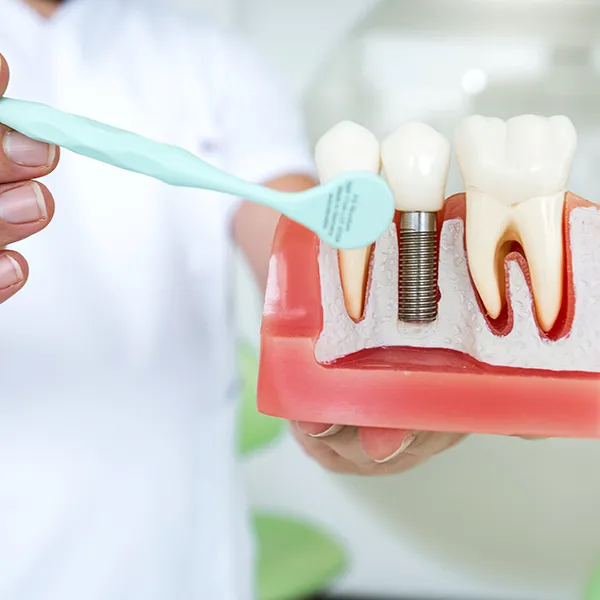Health Conditions in People Who Should Not Have Dental Implants
Certain health conditions can make you ineligible for dental implants because they heighten the risk of complications or implant failure. Some of the common health issues that may disqualify you from receiving dental implants include:
Uncontrolled Diabetes
Uncontrolled diabetes can impair your body’s ability to heal and combat infections, raising the risk of complications during and after dental implant surgery or any surgery in general.
Cancer
Patients with cancer affecting the head or neck (or those undergoing radiation therapy in these areas) are among those who should not have dental implants. This is because radiation can weaken bone quality and hinder healing, making it challenging for the jawbone to effectively support an implant.
Autoimmune Diseases
People with autoimmune diseases like diabetes, rheumatoid arthritis, or lupus are also among those who should not have dental implants, as these conditions can impair healing and heighten the risk of infection.
Moreover, some medications prescribed for these conditions can disrupt bone growth and healing, essential for properly integrating dental implants.
Lifestyle Factors in People Who Should Not Have Dental Implants
Smoking
Research indicates that smokers experience a higher rate of dental implant failure compared to non-smokers. Smoking negatively impacts blood circulation in the mouth, which is essential for proper healing following implant surgery. Additionally, it weakens immune function and increases inflammation in the gum tissues around the implant site.
Heavy Alcohol Consumption
Excessive alcohol consumption is associated with poor outcomes for dental implants, as it can interfere with bone formation around the implant. Heavy drinking also impairs the body’s ability to fend off infections and delays wound healing after surgery by dehydrating the cells necessary for tissue repair.
Oral Health Conditions in Those Who Should Not Have Dental Implants
Poor Oral Hygiene
Having poor oral hygiene can lead to plaque buildup and bacterial infections around the implant site, potentially causing inflammation and ultimately leading to implant failure. If you have no inclination to commit to your oral hygiene, you are someone who should not have dental implants.
Gum Disease
Gum disease can also make you among those who should not have dental implants. This condition affects the tissues surrounding your teeth—such as the gums, ligaments, and bone—causing inflammation and infection. If untreated, gingivitis (the early stage of gum disease) can progress to periodontitis, resulting in tooth and bone loss in the jaw area where an implant would be placed.
Insufficient Jawbone Density
Dental implants need adequate jawbone density to ensure stability and support. Individuals may have insufficient bone density due to factors such as tooth loss, gum disease, or aging, making them among those who should not have dental implants.
Medications That Disqualify a Person From Getting Dental Implants
Steroids
Corticosteroids, often prescribed for inflammation and autoimmune disorders, can adversely affect bone healing around dental implants. Prolonged use of these steroids may reduce blood flow to your jaw due to suppression of your immune system, thereby complicating the integration of implants with the surrounding bone.
Bisphosphonates
Bisphosphonates are used mainly to treat osteoporosis and other bone-weakening conditions. While they work to strengthen bones by preventing their natural breakdown, bisphosphonates have been associated with an increased risk of osteonecrosis (bone death) in the jaw after oral surgery or dental implant placement.
Antidepressants
Selective antidepressants, such as Prozac and Zoloft, can also affect the success of dental implants. Studies have shown that patients on antidepressants have a higher risk of implant failure because of the potential impact of these medications on bone metabolism and healing.
Blood Thinners
Anticoagulants or blood thinners, including warfarin and aspirin, can increase the risk of bleeding during dental implant surgery. While these medications do not automatically disqualify a person from receiving implants, it is crucial for your dentist to be informed about their use so that appropriate precautions can be implemented during the procedure.
Who is a Good Candidate for Dental Implants?
- People who have good overall health
- People who have a healthy oral environment
- People who have adequate jawbone density
- People who are non-smokers
- People with healthy gums
Conclusion
Dental implants can be an excellent option for many people, but certain medical conditions, habits, and dental issues might make some people ineligible for them. Understanding who should not have dental implants will help you decide whether this treatment is right for you.
It’s crucial to consult with your dentist to determine if dental implants are appropriate for you, considering your medical history and overall health.
Call to Schedule a consultation with Molar Dental in Katy, TX, and find out whether you are eligible for dental implants.




